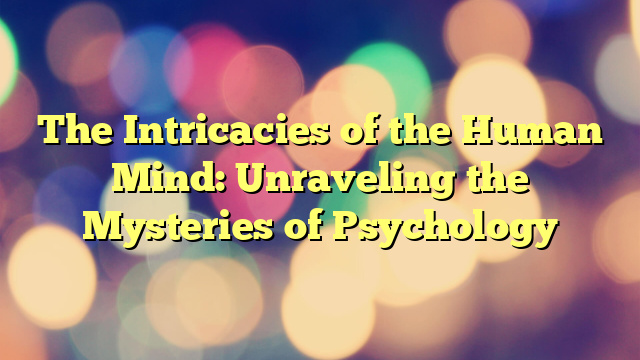The Intricacies of the Human Mind: Unraveling the Mysteries of Psychology
The Intricacies of the Human Mind: Unraveling the Mysteries of Psychology
Introduction
The human mind is a complex and fascinating subject that has intrigued scientists, philosophers, and ordinary people for centuries. Psychology is the scientific study of the human mind and behavior, and it seeks to understand the intricacies of the mind and how it influences our actions and decisions. In this article, we will explore the mysteries of psychology and delve into the fascinating world of the human mind.
The History of Psychology
Psychology as a scientific discipline has a relatively short history, dating back to the late 19th century. However, the study of the human mind and behavior can be traced back to ancient civilizations such as Greece, Egypt, and China. The Greek philosopher Aristotle, for example, wrote extensively about the mind and its functions, while the Chinese philosopher Confucius emphasized the importance of self-awareness and introspection.In the 17th century, the French philosopher Rene Descartes proposed the idea of dualism, which suggests that the mind and body are separate entities. This idea was later challenged by the British philosopher John Locke, who argued that the mind is a blank slate at birth and that all knowledge is acquired through experience.The birth of modern psychology can be traced back to the work of Wilhelm Wundt, a German psychologist who established the first psychology laboratory in 1879. Wundt believed that psychology should be a scientific discipline that focuses on the study of conscious experience and introspection.
Theories of Psychology
There are many different theories of psychology, each with its own unique perspective on the human mind and behavior. Some of the most influential theories include:
- Behaviorism: This theory emphasizes the role of environmental factors in shaping behavior. Behaviorists believe that all behavior is learned through conditioning, and that the mind is a black box that cannot be studied directly.
- Cognitive psychology: This theory focuses on the mental processes that underlie behavior, such as perception, memory, and attention. Cognitive psychologists believe that the mind is like a computer, processing information in a systematic and logical way.
- Psychoanalysis: This theory was developed by Sigmund Freud and emphasizes the role of unconscious thoughts and feelings in shaping behavior. Psychoanalysts believe that many of our behaviors are driven by unconscious desires and conflicts.
The Brain and Behavior
The brain is the most complex organ in the human body, and it plays a crucial role in shaping our behavior and emotions. The brain is divided into several different regions, each with its own unique functions and abilities.The frontal lobe, for example, is responsible for decision-making, planning, and problem-solving, while the temporal lobe is involved in memory and language processing. The amygdala, a small almond-shaped structure in the brain, is responsible for processing emotions such as fear and anxiety.Studies have shown that certain areas of the brain are more active during specific tasks or emotions. For example, the prefrontal cortex is more active when we are engaged in complex problem-solving tasks, while the amygdala is more active when we are experiencing fear or anxiety.
Mental Disorders
Mental disorders are conditions that affect the mind and behavior, and they can have a significant impact on a person’s quality of life. Some of the most common mental disorders include:
- Anxiety disorders: These disorders are characterized by excessive worry and fear, and they can interfere with daily activities and relationships.
- Mood disorders: These disorders, such as depression and bipolar disorder, are characterized by changes in mood and energy levels.
- Schizophrenia: This disorder is characterized by delusions, hallucinations, and disordered thinking.
Treatment for mental disorders typically involves a combination of medication and therapy, and it can take time to find the right treatment plan for each individual.
Conclusion
The human mind is a complex and fascinating subject that continues to intrigue scientists and ordinary people alike. Psychology is the scientific study of the mind and behavior, and it seeks to understand the intricacies of the human experience. By exploring the history of psychology, the different theories of psychology, the brain and behavior, and mental disorders, we can gain a deeper understanding of ourselves and the world around us.

